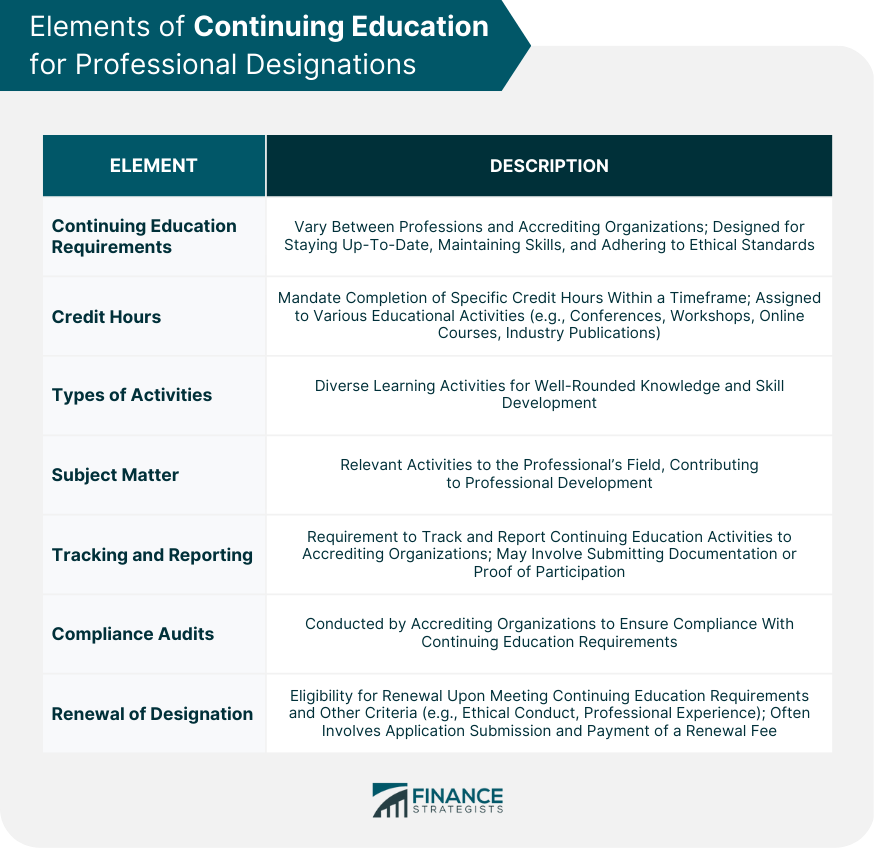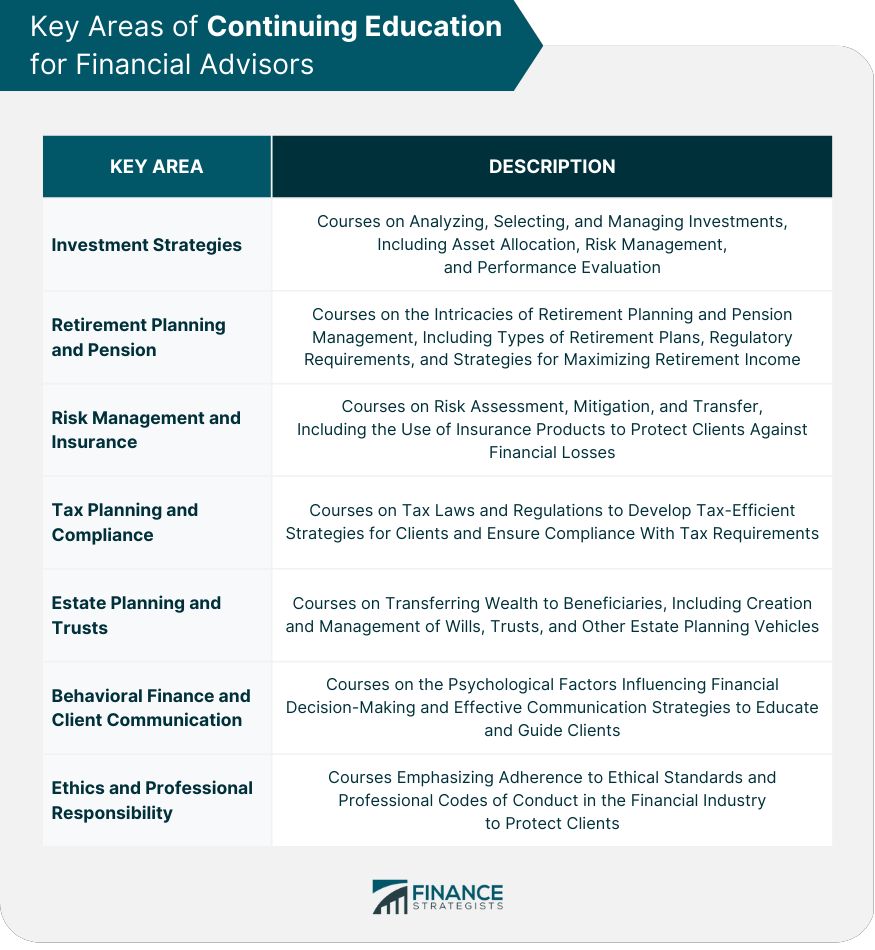In today's rapidly evolving financial landscape, Continuing Education (CE) is an essential tool for financial advisors to remain knowledgeable and competent in their profession. CE encompasses a wide range of learning activities that professionals undertake to maintain and enhance their expertise, skills, and abilities in their respective fields. Continuing education refers to a variety of learning activities that individuals engage in after completing their initial formal education. It includes programs, courses, and other educational experiences designed to foster lifelong learning and enhance professional skills. Continuing education offers numerous benefits, including increased job satisfaction, better career opportunities, and personal growth. It also helps individuals stay current in their field and enhance their professional network. For financial advisors, CE is not only vital for career growth but also for meeting regulatory requirements and maintaining professional certifications and licenses. The specific continuing education requirements for maintaining professional designations vary from one profession to another, as well as between different accrediting organizations. These requirements are designed to ensure that professionals stay up-to-date with industry advancements, maintain their skills, and adhere to ethical standards. Continuing education requirements often mandate a certain number of credit hours to be completed within a specified time frame, such as annually or biennially. Credit hours are assigned to various educational activities, such as attending conferences, participating in workshops, completing online courses, or even writing articles for industry publications. To meet continuing education requirements, professionals must often engage in diverse learning activities to ensure well-rounded knowledge and skill development. These activities may include: Workshops and seminars Conferences and symposiums Online courses and webinars Self-directed learning and research Industry-specific certifications Professional writing and publishing Continuing education activities must generally be relevant to the professional's field and contribute to their professional development. This may encompass learning about new technologies, methodologies, regulatory changes, or developments in the broader industry. Professionals are typically required to track and report their continuing education activities to their accrediting organization. This may involve submitting documentation of attendance, course completion certificates, or other proof of participation in educational activities. To ensure compliance with continuing education requirements, accrediting organizations may conduct audits of professionals' records. Professionals may be selected at random for audits and will be required to provide evidence of their continuing education activities. Upon meeting the continuing education requirements and maintaining any other necessary criteria, such as ethical conduct or professional experience, professionals may be eligible to renew their designation. This often involves submitting an application for renewal and paying a renewal fee. Continuing education can significantly impact an individual's career development by enhancing their skills, providing networking opportunities, keeping them current in their field, and enabling them to advance in the workplace. Continuing education encourages individuals to become adaptable and versatile in their professional roles. By learning new skills and refining existing ones, they can effectively respond to changes in their industry and handle diverse tasks or projects. This adaptability, coupled with personal growth, makes them valuable assets to their organizations and increases their potential for career success. Moreover, enhanced job performance and the ability to navigate industry challenges contribute to job satisfaction and overall career fulfillment. Continuing education events, including workshops, conferences, and seminars, serve as platforms for professionals to connect and engage with their peers. These networking opportunities allow individuals to broaden their professional circle, exchange ideas, and learn from others with diverse experiences and perspectives. Continuing education equips professionals with the most recent information, technologies, and best practices within their respective industries. By staying informed and adapting to these changes, they can maintain a competitive edge in a rapidly evolving job market. This knowledge enables them to implement innovative solutions, address emerging challenges, and ultimately provide superior service to their clients or employers. Engaging in continuing education is a clear indication of an individual's dedication to their professional development. This pursuit of knowledge and skills not only enhances their expertise but also sends a strong message to employers, colleagues, and clients about their drive for excellence. As a result, they become more appealing candidates for promotions, leadership roles, and other career advancement opportunities. Continuing Education is crucial for financial advisors as it helps them stay informed about the latest developments in the financial world, such as emerging investment products, market trends, and changes in regulatory environments. Furthermore, CE enables financial advisors to enhance their professional credibility, improve client trust and satisfaction, expand their knowledge and skills, and advance their career opportunities and earning potential. There are numerous benefits of pursuing Continuing Education for financial advisors, including: Financial advisors must be aware of the latest developments in the financial world, such as emerging investment products, market trends, and changes in regulatory environments. CE helps them stay informed and adaptable to the ever-evolving financial landscape. By participating in CE programs, financial advisors demonstrate their commitment to professional development and staying at the forefront of industry knowledge. This, in turn, enhances their credibility and reputation among clients and peers. Well-informed financial advisors are better equipped to provide sound financial advice to their clients, leading to increased trust and satisfaction. CE enables financial advisors to broaden their skill set, offering clients a more comprehensive range of services and solutions. Financial advisors who invest in their professional development through CE are likely to enjoy increased career advancement opportunities and higher earning potential. Financial advisors can focus on several key areas to enhance their expertise and knowledge, including: Investment strategies and portfolio management courses provide financial advisors with the knowledge and tools needed to analyze, select, and manage investments on behalf of their clients. Topics covered may include asset allocation, investment analysis, risk management, and performance evaluation. Retirement planning and pension funds courses help financial advisors understand the intricacies of retirement planning and pension management, including the various types of retirement plans, regulatory requirements, and strategies for maximizing retirement income. Courses in risk management and insurance cover various topics related to risk assessment, mitigation, and transfer, including the use of insurance products to protect clients against financial losses. Tax planning and compliance courses provide financial advisors with the knowledge and skills needed to navigate the complex world of tax laws and regulations. These courses help advisors develop tax-efficient strategies for their clients and ensure compliance with all relevant tax requirements. Estate planning and trusts courses focus on the various aspects of transferring wealth to beneficiaries, including the creation and management of wills, trusts, and other estate planning vehicles. Financial advisors can use this knowledge to help their clients protect and preserve their assets for future generations. Courses in behavioral finance and client communication help financial advisors understand the psychological factors that influence financial decision-making and develop effective communication strategies to educate and guide their clients. Ethics and professional responsibility courses emphasize the importance of adhering to ethical standards and professional codes of conduct in the financial industry. These courses help financial advisors maintain high ethical standards and protect their clients' best interests. Continuing education is an essential component of professional development for financial advisors. It helps them stay current with industry trends and regulations, enhance their professional credibility and reputation, and improve client trust and satisfaction. By participating in CE programs, financial advisors can ensure that they maintain the necessary knowledge and skills to provide sound financial advice to their clients. This, in turn, leads to increased client trust and satisfaction, ultimately benefiting both the advisor and their clients. Continuing education offers financial advisors numerous opportunities for personal and professional growth. By staying current with industry trends, enhancing their expertise, and expanding their skillset, advisors can better serve their clients, advance their careers, and increase their earning potential. Continuing education plays a critical role in the financial advising profession. As the financial landscape evolves, CE ensures that financial advisors remain knowledgeable, competent, and responsive to the needs of their clients. Moreover, working with a well-trained financial advisor, who has received continuing education in financial planning, can assist individuals in making informed decisions and developing a comprehensive plan to maximize their return on investment.Definition of Continuing Education
Elements of Continuing Education for Professional Designations
Requirements
Credit Hours
Types of Activities
Subject Matter
Tracking and Reporting
Compliance Audits
Renewal of Designation

The Impact of Continuing Education
Skill Enhancement
Networking Opportunities
Staying Current in the Field
Advancing in the Workplace
The Importance of Continuing Education for Financial Advisors
Benefits of Continuing Education for Financial Advisors
Staying Current With Industry Trends and Regulations
Enhancing Professional Credibility and Reputation
Improving Client Trust and Satisfaction
Expanding Knowledge and Skills to Serve Clients Better
Advancing Career Opportunities and Earning Potential
Key Areas of Continuing Education for Financial Advisors
Investment Strategies and Portfolio Management
Retirement Planning and Pension Funds
Risk Management and Insurance
Tax Planning and Compliance
Estate Planning and Trusts
Behavioral Finance and Client Communication
Ethics and Professional Responsibility

The Bottom Line
Continuing Education FAQs
Continuing education for financial advisors refers to ongoing professional development courses or programs designed to enhance and update their skills and knowledge in the financial planning industry.
Yes, financial advisors are required to complete continuing education hours annually to maintain their professional licenses or designations.
The required number of continuing education hours varies based on the type of license or designation held by the financial advisor and the state or organization that issued it. Typically, financial advisors need to complete between 15 to 30 hours of continuing education annually.
Courses that cover topics related to financial planning, such as investment strategies, risk management, estate planning, tax planning, and retirement planning, are typically approved for continuing education credit.
Yes, many continuing education courses for financial advisors are available online. These courses offer flexibility and convenience, allowing financial advisors to complete their required hours at their own pace and on their own schedule.
True Tamplin is a published author, public speaker, CEO of UpDigital, and founder of Finance Strategists.
True is a Certified Educator in Personal Finance (CEPF®), author of The Handy Financial Ratios Guide, a member of the Society for Advancing Business Editing and Writing, contributes to his financial education site, Finance Strategists, and has spoken to various financial communities such as the CFA Institute, as well as university students like his Alma mater, Biola University, where he received a bachelor of science in business and data analytics.
To learn more about True, visit his personal website or view his author profiles on Amazon, Nasdaq and Forbes.











